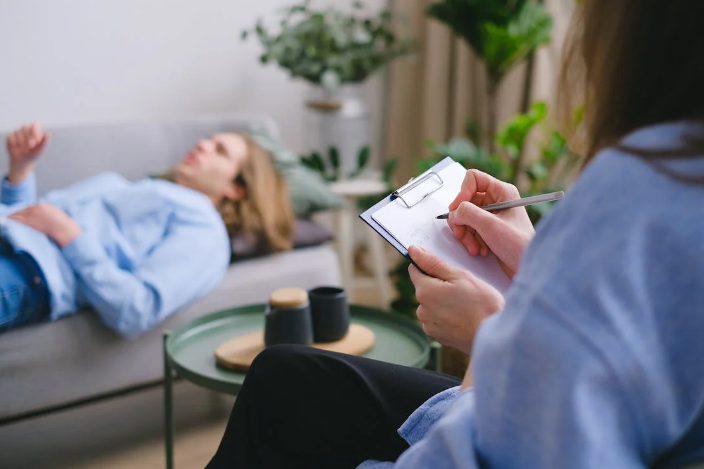What Are Some Common Self-help Methods For Coping With Stress?
Learn about some common self-help methods for dealing with stress.

Selfpause Affirmation App
Download the app to get 1,000’s of affirmation meditations and everything you need to write, record and listen to your own.
In today’s fast-paced world, stress has become a common problem that affects almost everyone at some point in their lives. Whether it’s work-related stress, relationship problems, financial issues, or health concerns, stress can take a toll on our mental and physical well-being. Fortunately, there are various self-help methods available that can help us cope with stress and improve our quality of life. In this article, we will explore some of the most common self-help methods for coping with stress.

- Exercise
Exercise is one of the most effective self-help methods for coping with stress. Physical activity releases endorphins, which are natural chemicals that reduce stress and improve mood. Exercise also helps to reduce muscle tension and promotes relaxation, which can alleviate stress-related symptoms such as headaches, insomnia, and digestive problems. Regular exercise can also improve our overall health, which can help to prevent stress-related illnesses such as heart disease, diabetes, and depression. Examples of stress-reducing exercises include walking, jogging, yoga, and swimming.
Mindfulness meditation is a practice that involves focusing on the present moment without judgment. This practice can help to reduce stress by calming the mind and promoting relaxation. Mindfulness meditation has been shown to reduce anxiety, depression, and chronic pain. It can also improve sleep quality and enhance overall well-being. To practice mindfulness meditation, find a quiet place where you can sit comfortably and focus your attention on your breath or a specific object. When your mind wanders, gently bring it back to the present moment without judgment.

- Deep Breathing
Deep breathing is a simple but effective self-help method for coping with stress. It involves taking slow, deep breaths from the diaphragm, which can help to reduce muscle tension and promote relaxation. Deep breathing can also slow down the heart rate and lower blood pressure, which can help to alleviate stress-related symptoms such as anxiety and panic attacks. To practice deep breathing, find a quiet place where you can sit or lie down comfortably. Close your eyes and focus on your breath. Inhale slowly through your nose, filling your lungs with air. Hold your breath for a few seconds, then exhale slowly through your mouth, releasing all the air from your lungs.
- Progressive Muscle Relaxation
Progressive muscle relaxation is a self-help method that involves tensing and relaxing different muscle groups in the body. This practice can help to reduce muscle tension and promote relaxation. Progressive muscle relaxation has been shown to reduce anxiety, depression, and chronic pain. It can also improve sleep quality and enhance overall well-being. To practice progressive muscle relaxation, find a quiet place where you can sit or lie down comfortably. Start by tensing the muscles in your feet, then slowly release the tension. Move up to your legs, hips, abdomen, chest, arms, and face, tensing and relaxing each muscle group.
- Social Support
Social support is an important self-help method for coping with stress. It involves seeking help and comfort from friends, family, or a support group. Social support can help to reduce stress by providing emotional support, practical assistance, and a sense of belonging. It can also improve our coping skills and enhance our resilience. To seek social support, reach out to people you trust and talk about your feelings and concerns. Join a support group or participate in social activities that interest you.
- Time Management
Time management is a self-help method that involves organizing and prioritizing our time to reduce stress and improve productivity. Effective time management can help to reduce stress by reducing the number of tasks and deadlines we face. It can also help to improve our sense of control and reduce the feeling of being overwhelmed. To practice time management, make a list of your tasks and prioritize them according to importance and urgency. Use a calendar or planner to schedule your tasks and allocate specific times for each task. Avoid procrastination and try to break down larger tasks into smaller, more manageable ones.
- Healthy Lifestyle
Maintaining a healthy lifestyle is another self-help method for coping with stress. This involves adopting healthy habits such as eating a balanced diet, getting enough sleep, and avoiding drugs and alcohol. A healthy lifestyle can help to reduce stress by improving our physical health and emotional well-being. It can also improve our resilience and help us cope with stress more effectively. To adopt a healthy lifestyle, make small changes to your daily habits. Eat more fruits and vegetables, drink plenty of water, get at least 7-8 hours of sleep each night, and avoid smoking and excessive alcohol consumption.
- Creative Activities
Engaging in creative activities such as art, music, or writing is another self-help method for coping with stress. Creative activities can help to reduce stress by providing a positive outlet for emotions and promoting relaxation. They can also improve our mood and enhance our sense of self-esteem and accomplishment. To engage in creative activities, find an activity that interests you and set aside some time each day to practice it. This could involve taking an art class, playing an instrument, or writing in a journal.

- Cognitive Behavioral Therapy (CBT)
Cognitive Behavioral Therapy (CBT) is a type of psychotherapy that can help to reduce stress by changing negative thought patterns and behaviors. CBT involves identifying negative thoughts and replacing them with positive ones. It can also involve learning new coping skills and strategies for managing stress. CBT has been shown to be effective in treating a wide range of mental health problems, including anxiety, depression, and post-traumatic stress disorder (PTSD). To access CBT, talk to your healthcare provider or seek a referral to a mental health professional.
In conclusion, stress is a common problem that affects almost everyone at some point in their lives. Fortunately, there are various self-help methods available that can help us cope with stress and improve our quality of life. These methods include exercise, mindfulness meditation, deep breathing, progressive muscle relaxation, social support, time management, healthy lifestyle, creative activities, and cognitive behavioral therapy. By practicing these methods regularly, we can reduce the impact of stress on our mental and physical well-being and enhance our overall sense of resilience and well-being.
